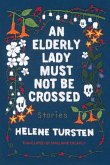Being exhausted, Rose’s mother suggests a Mediterranean cruise for her daughter and the two kids Emma and Gabriel. One night, when she cannot sleep on board, she witnesses the rescue of refugees whose boat collapsed. Between fascination and horror due to the dead she also sees, she makes contact and
even offers her son’s cell phone to one of them. Younès and the others disappear as quickly as they…mehrBeing exhausted, Rose’s mother suggests a Mediterranean cruise for her daughter and the two kids Emma and Gabriel. One night, when she cannot sleep on board, she witnesses the rescue of refugees whose boat collapsed. Between fascination and horror due to the dead she also sees, she makes contact and even offers her son’s cell phone to one of them. Younès and the others disappear as quickly as they have been saved since nothing is meant to disturb the cruisers’ holidays. Back in Paris, Rose cannot forget about the encounter but it is only a couple of months later that she will hear from the young African again and this time, she is not stunned and frozen but eager to provide help herself.
Marie Dariquessecq has chosen one of the big issues of European politics of the last five years for her novel. What she masterly contrasts is life and its chances of those who live in Europe and are well-off – which does not secure them from worries and problems – and those who risk everything, even their lives, for a better living or a dream. When these worlds collide, it is interesting to see how people react.
When we meet Rose, her career and family seem to totally wear her out. The cruise which was meant to provide her with some relaxation only offers new stressors and is far from helping her to come down a bit. Only after the family has moved to the countryside and her career has come to an unexpected standstill is she able to re-think the things in her life which really matter. This allows her to take action when Younès is in need.
The most evident contrast is shown between her kids and the refugees. Even though Emma and Gabriel are not nasty or detestable, they simply behave like ordinary kids, but they appear to be consume-oriented, materialistic and ungrateful for all that is given and offered to them. Bringing Younès into the family seems to fulfil a void that has been there hidden all the time.
A lot is not said in the novel, we do not learn much about Younès, yet, it is not a story about a poor refugee, he is actually a fighter who does not give up and follows his dream. Much more interestingly is what the encounter sets free in Rose and makes her reassess her life. An interesting read which offers a lot of food for thought.








